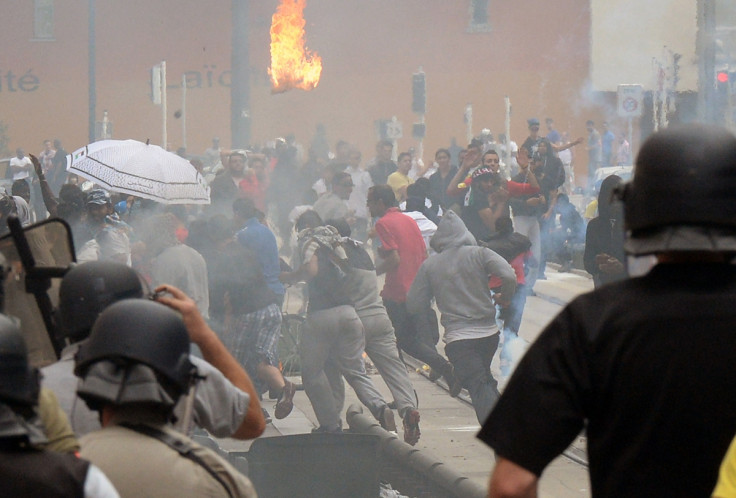Israeli -Gaza Conflict: Paris Jews Rally to Defend 'Little Jerusalem' Synagogue from Pro-Palestinians

The French government is struggling to cope with communal violence fuelled by the Israeli - Palestinian conflict, as tensions reached a new high after a Paris suburb known as "little Jerusalem" for its mixed Jewish and Arab composition descended into chaos at the weekend.
Hundreds of pro-Palestinian demonstrators defied a protest ban and took to the streets in the suburb of Sarcelles north of the capital.
They were faced by police and Jewish self-defence groups that cordoned off a synagogue.
The protest soon turned violent and groups of troublemakers went on a rampage. Cars were set ablaze, stores pillaged and clashes with police erupted.
Security forces, backed by a helicopter overhead, fired tear gas and shots from non-lethal guns during hours of unrest; 19 people were arrested.
Tensions peaked as some demonstrators targeted a local synagogue, where dozens of Jewish youths — some armed with iron bars — were waiting for their rivals, chanting slogans.
A cordon of police kept the opposite factions apart.
The Jewish Defence League (JDL), a far-right organization banned in Israel and America as a terrorist group, said that some 200 members of various Jewish self-defence outftis had arrived to help police defend the synagogue from "savages".
It was the third time in eight days that pro-Palestinian demonstrations turned violent in the country that is home to Europe's largest Jewish community and Muslim population.
On July 13, violent anti-Israeli protesters attacked two Paris synagogues, where the presence of JDL members was also reported.
Six days later, troublemakers hijacked another unauthorised anti-Israel protested in Paris' northern 18th arrondissement, throwing stones and bottles at riot police, who responded with tear gas.
Both the 18th arrondissement and the Sarcelles gatherings had been banned to ensure peace.
After the clashes, the government scrambled to defend its decision, amid accusations it had backfired provoking extremists to defy authorities and take to the streets.
Le Monde newspaper wrote the government acted as an "arsonist firefighter".
"If we didn't ban the demonstration, it would have probably been worse," said Interior Minister Bernard Cazeneuve, as he visited Sarcelles in the aftermaths of the clashes.
Cazeneuve told BFMTV that leaflets distributed in the suburb ahead of the demonstration urged pro-Palestinian protesters to bring batons, fire extinguishers and other makeshift weapons.
Prime Minister Manuel Valls described the ban as a "brave choice" and condemned the violence.
"What's happened in Sarcelles is intolerable: attacking a synagogue or a kosher grocery is quite simply anti-Semitism, racism," he said.
An umbrella group representing French Jews, known as CRIF, said that eight synagogues have been attacked in the last seven days alone.
"Anti-Semitic violence is getting worse and worse every day; it is time to consider it as sort of 'terrorist drift' and treat it as such," CRIF said.
Meanwhile, leftist lawmaker Jean-Jacques Candelier urged the government to outlaw the Jewish Defence League, saying it was a "criminal organisation" and describing its members as "barbarians".
President Francois Hollande has called for peace and unity.
"The Republic is about being able to live together, to look at our history and at the same time to always be ready to defend democratic values, not to be influenced by arguments that are too far away from here to be imported, not to be swept away by global shock waves," he said.
Numerous videos showing the clashes in Sarcelles was posted on social media. In this video pro-Israel demonstrators are seen as they intone France's national anthem near the local synagogue.
© Copyright IBTimes 2025. All rights reserved.




















